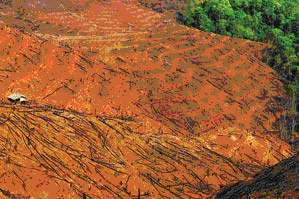
China's rainforests are being stripped to make way for rubber plantations. ZI BO
Xishuangbanna, the Dai Autonomous Prefecture in China's southwestern Yunnan province, had always been the dreamland for many that seek tropical beauty and peace. Yet its beauty is threatened by the onslaught of rubber plantations recently. Xishuangbanna Tropical Botanical Garden (XTBG), CAS' flagship institute for conservation research has been waging a war against rubber plantations.
Since its founding in 1959, XTBG researchers have been collecting ecological and biological data in this region, and they see drastic deterioration in the region's ecosystems, especially over the last decade when the demand of rubber soared. According to He Yunling and Zhang Yiping from XTBG, rubber plantations increased from 12% of the total land cover to 46%, whereas forested areas dropped from 49% to 28% between 1988 and 2006. Temperature and precipitation data from meteorological stations in Xishuangbanna show that the region has been warming since the 1960s, with less rainfall and more severe droughts, as stated by Hu Huabin and Liu Wenjun , also from XTBG.
Economic development has been the driving force behind deforestation and over plantation of rubber. "Destroying ecosystems will backfire and hit economic development in the long run," warns Cao Min, an ecologist at the XTBG. With research providing basis for the policy-makers, XTBG is seeking to work with the local officials to counter the serious problems facing the ecosystem in the region.
A pilot program of Biodiversity Conservation Corridors Initiative in the Greater Mekong Subregion initiated by World Bank had been running successful and is being exercised on a large scale. Meanwhile, XTBG is expecting to expand into a tropical research institute with larger capacity to cope with the challenges.
"There is no doubt that our road will be long, that our climb will be steep." Barack Obama's statement is also appropriate in addressing the ecological crisis that is challenging China at large and threatening Xishuangbanna in specific.





